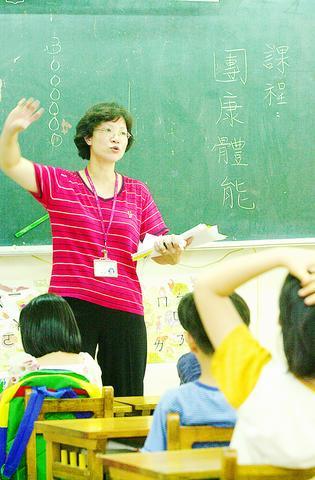When Feng Chiou-jen (
"I had always depended on my husband for money, and I never thought that I would need any savings of my own. He left me with nothing, and I had to ask my grown daughter to help me out," said Feng, a middle-aged housewife. "I was fifty, with no experience, so it was almost impossible to find a job."

PHOTO: GEORGE TSORNG, TAIPEI TIMES
Desperate for work, a friend introduced Feng to the Peng Wan-ru Foundation (

PHOTO: GEORGE TSORNG, TAIPEI TIMES
When Feng first took housekeeping courses last year, her tuition was completely covered by funds that the government had given the foundation. After she passed the course and was licensed, she began to work for families that had found her through the foundation.
"With a steady job, I started my own savings account and could support myself, so that I didn't have to depend on my daughter anymore. I am very grateful to the foundation for helping me in the most difficult time of my life," Feng said.
In November 1996, a DPP advocate for women's safety and development, Peng Wan-ru, disappeared after getting into a taxi in Kaohsiung. She was later found raped and killed, a victim of the pressing issue she had just been discussing with fellow DPP members. In 1997, the Peng Wan-ru Foundation, which has no political affiliation, was established in the hope that Peng's lifetime work could be continued.
The foundation isn't just a charity organization; it is a service that aims to create a universal welfare system for Taiwan. This is a seemingly far-fetched goal for a single organization.
But like its namesake, the six year-old foundation maintains high ideals of creating a safe society in which all citizens -- regardless of age, sex or income -- would be taken care of.
The foundation has seen a significant decrease in government funding in recent years, but executives maintain that the government would be helping all citizens by giving financial aid to their cause.
The foundation's main resources are currently focused on helping single women and mothers aged 30 to 60 find employment. It trains these women for their home-care and after-school programs.
After trainees pass the required courses, the foundation then matches these women with households or elementary schools that have expressed the need for such services.
This system benefits many parties, as explained by the charity's Assistant Executive Officer Wang Hwei-Chu (
"We are giving these middle-aged women a second chance in life, providing them with the means of supporting themselves by training them for work. At the same time, employers can feel assured that the housekeeping and child-care services provided by the trainees are safe and of good quality."
In its early years, the foundation's trainees served as counselors for middle-school students who teachers felt had gone astray. When the counseling proved ineffective, the organization decided that it needed to reach out to children at a much younger age.
"Children are like puppets," said Wang. "Without all the right strings, they cannot stand up at all. This is why we started the after-school program."
Mothers trained by the foundation go to elementary schools in their various communities after classes to aid students with their homework, lead them in games and provide basic guidance that the charity feels children need in the outside world.
The foundation, which has regional offices in Taipei, Taichung, Tainan and Kaohsiung, has trained over 6,300 women, 40 percent of whom are employed through the groups programs.
When PWR began its training programs in 1999, more than half of their funds came from various government agencies.
Now, however, government subsidies only account for one third of its funds.
"When we first proposed our ideas to people in the government, they were very enthusiastic in helping us because they liked the concept. Now that our program has been running for a few years, the government expects us to be self-sufficient," said Peng Wan-ru Foundation Chairperson Liu Yu-Shiou (劉毓秀).
After working as a housekeeper for a few months, Feng decided to take the child-care courses so that she could take on more jobs.
However, when she began child-care training last month, the charity no longer had enough funding to cover the tuition fee.
Despite being an enthusiastic supporter of the foundation, Feng confesses, "I wouldn't have been able to pay the NT$8,500 tuition this time if I hadn't gotten back together with my husband."
The reduction in government funding has caused such a large hole in the foundation's bankbooks that starting in January this year it began to collect a "membership fee" of NT$750 a month from trainees that hope to find employment through the charity.
"I sought help from the foundation because I had no money, no work experience and two young children to support," laments 39-year old single mother Hung Chiou-jin (
Hung was lucky in that her employers continued to hire her as a housekeeper when she explained her dilemma. Many other women who couldn't pay the membership fee were not so lucky after the foundation had to inform their employers that they were no longer part of its program.
"We feel that the government should help us financially because we are providing a welfare system that could benefit all of society," said Liu.

DEFENSE: The National Security Bureau promised to expand communication and intelligence cooperation with global partners and enhance its strategic analytical skills China has not only increased military exercises and “gray zone” tactics against Taiwan this year, but also continues to recruit military personnel for espionage, the National Security Bureau (NSB) said yesterday in a report to the Legislative Yuan. The bureau submitted the report ahead of NSB Director-General Tsai Ming-yen’s (蔡明彥) appearance before the Foreign and National Defense Committee today. Last year, the Chinese People’s Liberation Army (PLA) conducted “Joint Sword-2024A and B” military exercises targeting Taiwan and carried out 40 combat readiness patrols, the bureau said. In addition, Chinese military aircraft entered Taiwan’s airspace 3,070 times last year, up about

A magnitude 4.3 earthquake struck eastern Taiwan's Hualien County at 8:31am today, according to the Central Weather Administration (CWA). The epicenter of the temblor was located in Hualien County, about 70.3 kilometers south southwest of Hualien County Hall, at a depth of 23.2km, according to the administration. There were no immediate reports of damage resulting from the quake. The earthquake's intensity, which gauges the actual effect of a temblor, was highest in Taitung County, where it measured 3 on Taiwan's 7-tier intensity scale. The quake also measured an intensity of 2 in Hualien and Nantou counties, the CWA said.

The Overseas Community Affairs Council (OCAC) yesterday announced a fundraising campaign to support survivors of the magnitude 7.7 earthquake that struck Myanmar on March 28, with two prayer events scheduled in Taipei and Taichung later this week. “While initial rescue operations have concluded [in Myanmar], many survivors are now facing increasingly difficult living conditions,” OCAC Minister Hsu Chia-ching (徐佳青) told a news conference in Taipei. The fundraising campaign, which runs through May 31, is focused on supporting the reconstruction of damaged overseas compatriot schools, assisting students from Myanmar in Taiwan, and providing essential items, such as drinking water, food and medical supplies,

New Party Deputy Secretary-General You Chih-pin (游智彬) this morning went to the National Immigration Agency (NIA) to “turn himself in” after being notified that he had failed to provide proof of having renounced his Chinese household registration. He was one of more than 10,000 naturalized Taiwanese citizens from China who were informed by the NIA that their Taiwanese citizenship might be revoked if they fail to provide the proof in three months, people familiar with the matter said. You said he has proof that he had renounced his Chinese household registration and demanded the NIA provide proof that he still had Chinese